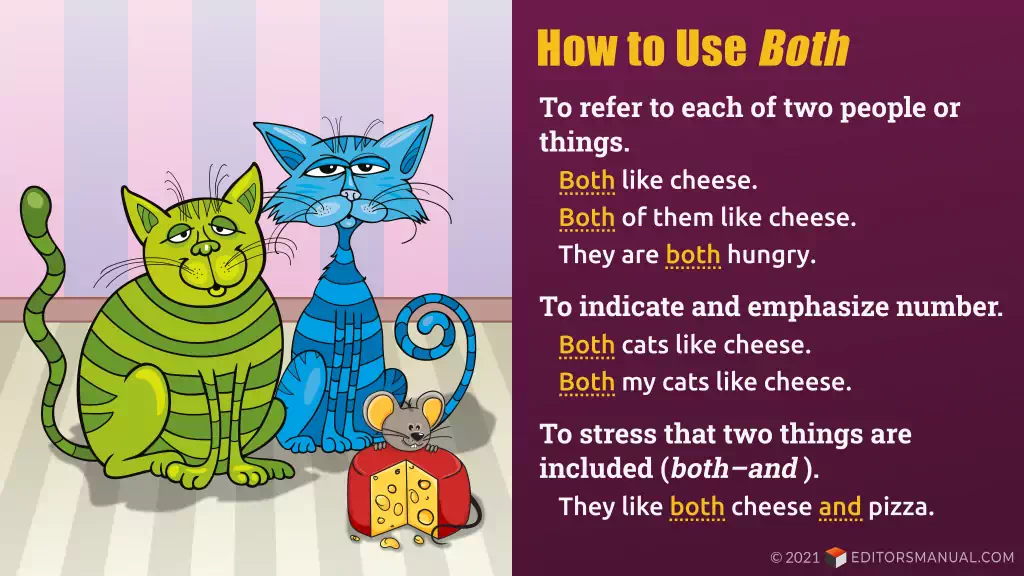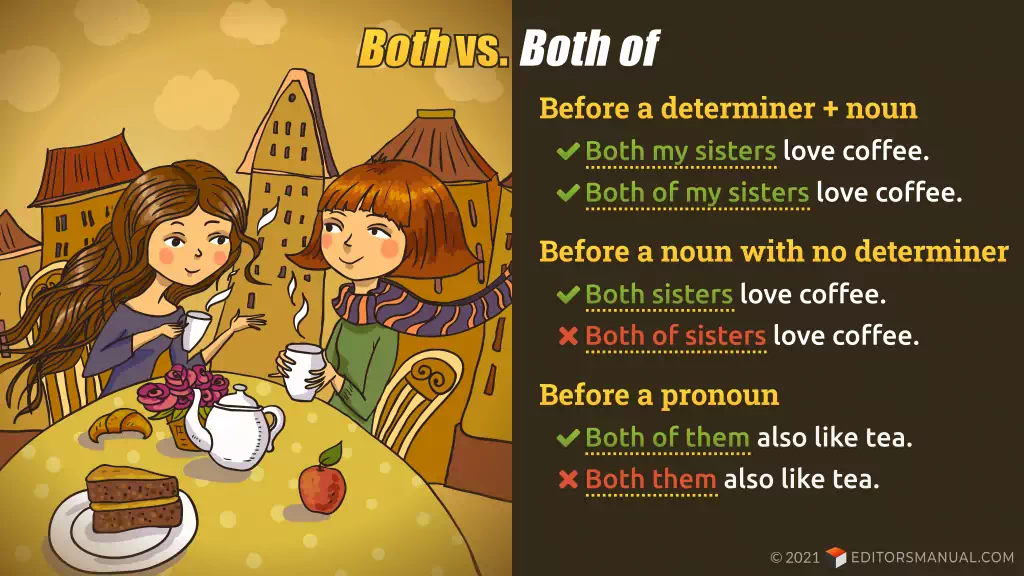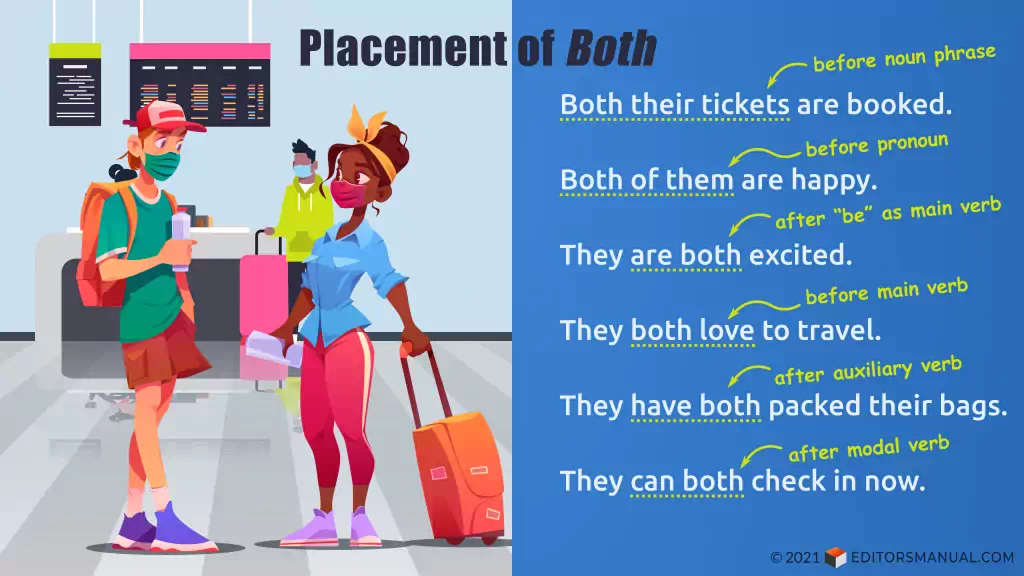Both, Both of, Both–And
Summary
The word both refers to each of two people or things. Before a noun, use both. Before a pronoun, use both of.
- Both destinations are now open to tourists.
- Both of us are happy.
Both and both of can be used interchangeably before a determiner.
- Both (of) these cakes are delicious.
With both–and as a linking expression, maintain parallel structure in formal texts.
- Poor: The signs are both in English and Spanish.
- Better: The signs are in both English and Spanish.
Use neither or either instead of both in negative sentences.
- Neither of us is happy.
Instead of “Both of us are not happy.”
- I can’t find either of my shoes.
Instead of “I can’t find both my shoes.”
No commas are needed around both.
- Both my manager and I have replied to your emails.
- This book makes me both happy and sad.
What is both?
The word both refers to each of two people or things.
- Both are my friends.
- Both reports are due today.
- Both almonds and walnuts are good for health.
- Farley has lost both his bags.
- Maya likes both books and music.
- They were both excited about the trip.
Both can be used as a pronoun in place of a noun phrase.
- Both have grown old.
The pronoun both refers to two people.
- Both of them like music.
- I’ll take both, thanks.
Both can also be used adjectivally (as a determiner or predeterminer) to emphasize a reference to two people or things as opposed to just one.
- Both stores are true.
As a determiner before the noun “stories.”
- Both these stories are true.
As a predeterminer before the noun phrase “these stories.”
- I need both tickets, please.
Both can be paired with and to stress the inclusion of two people or things. It thus works as a conjunction, a word that helps join two parts of a sentence.
- Both my dog and my cat have grown old.
- Lulu likes both pizza and pasta.
- To reach Koh Samui, you have to take both a bus and a catamaran.
- Rita detests both fruits and vegetables.
It is sometimes thought that the word both is unnecessary when it is already clear that reference is being made to two people or things. But both is a useful and necessary word to refer to each of the two.
- Both her parents were teachers, and she grew up believing that education was important.
Emphasizes that each of the two parents was a teacher; more emphatic than simply saying “Her parents were teachers.”
In this article, we discuss how to use both correctly in all its uses.
Is both singular or plural?
Both as a pronoun refers to two people or things and is always plural.
- Both
is/are correct. - Both
wants/want these tickets. - Both
likes/like cheese.
When used adjectivally, both again refers to two people or things. Therefore, it is used with plural instead of singular nouns.
- Both
option/options are correct. - Both my
sister/sisters want these tickets. - Both
cat/cats like cheese.
In both–and constructions as well, use plural instead of singular verbs.
- Both Farley’s wallet and his watch
is/are lost. - Both the table and the chairs
is/are wobbly. - Both tea and coffee
is/are served here.
Both vs. both of
Both and both of can both occur before a determiner, with no difference in meaning. (A determiner is a word that appears before a noun and qualifies its reference—these houses, her children, your ideas).
- Both these houses are for sale.
- She claims to love both of her children equally.
- Both your ideas sound great to me.
- Both of my wrists hurt when I use the phone.
Most editors will delete of in such a construction (both of these houses), since the preposition of doesn’t add to the meaning of the sentence. Its use is still grammatically acceptable and quite common in speech.
When it is clear what is being referred to, determiners are often omitted with both. Directly before a noun, only both can be used, not both of.
- Correct: Both houses are for sale.
- Correct: Both children now go to school.
- Correct: Both ideas sound great to me.
Before a pronoun like them or us, use both of, not simply both.
- Correct: Both of them are correct.
Not “Both them are correct.”
- Correct: They have invited both of us to the party.
But both is perfectly fine after a pronoun.
- You can ask them both what they think.
- They both play the piano.
- We both love to travel.
- They have invited us both to the party.
- I want you both to listen to me carefully.
There is no difference in meaning between “I like them both” and “I like both of them.” However, the “both of + pronoun” construction is generally preferred after a preposition (on, of, for, with, etc.).
- I have worked with both of them.
Seen more often than “I have worked with them both.”
- These passes are for both of us.
Used more often than “These are for us both.”
Position of both in a sentence
Both can appear before or after the phrase it modifies.
- Correct: Both of them work from home.
orCorrect: They both work from home.
- Correct: Both their cats are happy about it.
orCorrect: Their cats are both happy about it.
Some writers prefer “Both of them are happy” to “They are both happy,” arguing that the reader might be misled into expecting more information to appear in the second sentence: They are both happy and something else—what? In reality though, readers are used to parsing a sentence with both correctly from context. Both the following sentences are perfectly acceptable and mean the same thing.
- Correct: Both of them are happy.
orCorrect: They are both happy.
Interestingly, in sentences like “They are both happy,” both appears in an adverbial position (before the adjective). But it still refers to the noun phrase (their cats) rather than describing the adjective (happy). Therefore, it still functions as a pronoun rather than an adverb. Both often takes adverbial positions in sentences, still performing the duties of a pronoun by referring to a noun.
- They both want to go to Thailand.
between subject (they) and main verb (want)
- They have both already been to Malaysia.
after auxiliary verb (have)
- They can both paint.
after modal verb (can)
- They are both freelancers.
after be as the main verb (are)
When the main verb in a sentence is the be verb (are, were), the word both generally appears after rather than before the verb.
- We were both happy.
Preferred to “We both were happy.” But “Both of us were happy” is perfectly fine.
They are both doctors.
Both–and as linking term
The word both combines with and to emphasize the inclusion of two people or things. Use both—and to join two parts of equal importance in a sentence.
- Anita is both kind and intelligent.
Emphasizes that she has both qualities and not just one; more emphatic than “Anita is kind and intelligent.”
- Lulu likes both cupcakes and muffins.
- We are open on both Saturday and Sunday.
- You need to submit both an application and a statement of purpose.
- Both Anita and Maya have applied for this job.
- You should pack both shoes and sandals.
Both and and thus form a pair of correlative conjunctions. In formal writing, the two elements joined by both–and should be grammatically balanced and parallel in structure.
- Poor: They have offices both in London and Paris.
Both and and should join two balanced elements in a sentence. “In London” is a prepositional phrase, while “Paris” is a noun. Take “in” out of the construction to create balance.Better: They have offices in both London and Paris.Both and and now join two balanced elements, which are both nouns.
- Poor: We are open both on weekends and weekdays.
Better: We are open both on weekends and on weekdays. - Poor: This contract needs to be signed both by Anita and me.
Better: This contract needs to be signed by both Anita and me.
In formal writing (such as academic, business, and other official texts), ensure parallel structure. Don’t use both–and to join two unbalanced or mismatched elements in a sentence.
- Poor: I have worked both in sales and manufacturing.
Better: I have worked in both sales and manufacturing.
Both-and can join two pairs of plural nouns to refer to two classes or categories of things.
- Both cats and dogs make great companions.
- You should eat both almonds and walnuts.
Both is not generally used with other connectives like as well as and together with in formal writing, although such constructions are occasionally seen in informal usage. These connectives are quasi-conjunctions, so using them in place of and is semantically possible but causes syntactic confusion, which is probably why most writers and editors avoid such usage altogether.
- Poor: Both the cat as well as the dog like pizza.
Better: Both the cat and the dog like pizza.
Both in negatives: Both vs. neither and either
In general, use neither instead of both in negative sentences: for example, use “neither can” instead of “both can’t.”
- Neither of the contestants can bake.
Preferred to “Both the contestants can’t bake.”
- Neither of them is an astronaut.
Instead of “Both of them are not astronauts.”
Similarly, use neither–nor instead of both–and in negative sentences.
- Neither my mother nor my father can bake.
Preferred to “Both my mother and my father cannot bake.”
- Neither the bus nor the train is available.
Instead of “Both the bus and the train aren’t available.”
Both may sometimes be used in negative statements when the word not needs to be emphasized.
- “I thought they were experts.”
“Well, clearly, they are both not experts.”
With a negative verb, use either instead of both to refer to two people or things.
- It isn’t clear from
both studies/either study whether caffeine is good or bad for you. - Farley hasn’t heard back from
both/either of the places he applied to last month.
With either-or constructions, not both may be used to emphasize the exclusive nature of the options presented.
- You can have shoes that are either pretty or comfortable, not both.
- This implies that people can be either wealthy or decent, not both.
Use of the: Both or both the?
The article the is often omitted after both, although using it is not incorrect.
- Both (the) movies deserve an Oscar.
- We should talk to both (the) students about respecting people’s boundaries.
- Because both (the) applicants are equally qualified, it’s impossible to choose.
Determiners are often omitted after both when it is clear what is being referred to.
- Both these cupcakes are mine.
orBoth cupcakes are mine.
Commas with both
In general, a comma isn’t needed before or after both in a sentence.
- Poco likes both pizza and pasta.
- Both Mauritius and Fiji are beautiful countries.
- Mauritius and Fiji are both beautiful countries.
A comma may be required for a reason unrelated to the use of both—for example, after a subordinate clause or before a nonrestrictive clause. Use the comma then as usual.
- If this is right, both of us are wrong.
- I bought both, which is funny because neither of them fits me.
Examples from literature
Here are some examples from published writing that show how the word both is used in sentences.
They had daubed my face and both my hands with a sort of ointment, very pleasant to the smell, which, in a few minutes, removed all the smart of their arrows.
— Jonathan Swift, Gulliver’s Travels (1726)I promised myself both of these when my creation should be complete.
— Mary Wollstonecraft, Frankenstein (1818)‘Really, girls, you are both to be blamed,’ said Meg.
— Louisa May Alcott, Little Women (1869)A gross deception has been practised on both of us.
— Oscar Wilde, The Importance of Being Earnest (1895)He had either been engaged to somebody or quarrelled with her family and old Parry disliked them both equally, which was a great bond.
— Virginia Woolf, Mrs. Dalloway (1925)The best marriages, like the best lives, were both happy and unhappy.
— Anne Morrow Lindbergh, Dearly Beloved (1962)The word that I’m thinking of right now is genre, one of those French words, like crêpe, that no one can pronounce both correctly and without sounding pretentious.
— Michael Chabon, Introduction to McSweeney’s Enchanted Chamber of Astonishing Stories (2004)




